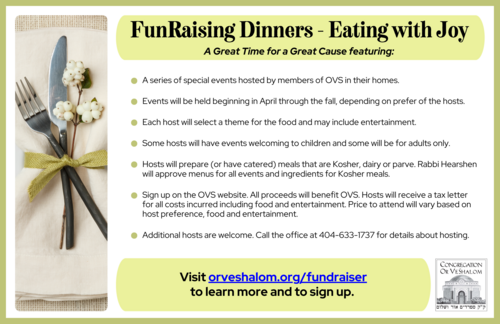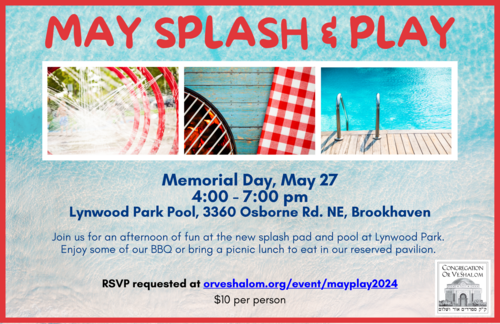December 7, 2023
12/07/2023 02:26:52 PM
Rabbi Hearshen
| Author | |
| Date Added | |
| Automatically create summary | |
| Summary |
Last week I was in Israel trying to help, and to bear witness to the lives being lived. My last stop in Israel was to drop off a present for a congregant at their family’s home in Modi’in. I’d never been to this town before and I can attest to it being a beautiful one filled with lovely neighborhoods and modern amenities. When I was approaching the city, it dawned on me I was a week too early to be in this city.
The city of Modi’in was purposely built in the 1990s on the site of what we traditionally believe to be the home city of the Maccabees and thus it’s the birthplace of Hanukkah (figuratively speaking). The world in the days of the Maccabees, and the world today, don’t seem to be all that different and that’s a tragedy beyond words. When we teach the story of Hanukkah, we often talk about the external forces that sought to destroy us. It’s another example of the ancient hatred (anti-Semitism) our people have continuously suffered and our ability to overcome this hatred. In this telling of the story, the light we bring into the world during Hanukkah is a force to overcome the darkness of hatred and bigotry.
In a more historical and authoritative retelling of the events, we find a much more nuanced story of Jewish assimilation and a battle between Jews who wanted a more pure and traditional observance (Maccabees/Hasmoneans), and those who wanted to assimilate and more fully fit in to the Greek culture around them (Hellenists). This story of the battle depicts a civil war that was part of the struggle between our ancestors and the Assyrian Greeks. This story adds greater nuance to the light we bring into the world during the darkest time of the year, and that we have an obligation to reclaim that which is ours. We have an obligation to remain true to our past, present and future. We must fight against assimilation and “rededicate” (Hanukkah means dedication) ourselves to our people, our heritage and our religion.
Both these narratives are of the utmost importance right now. One doesn’t need to be a scholar to see the fires of anti-Semitism are strengthening and growing in their intensity. We’ve reached a global epidemic we haven’t experienced in modern times and it’s not only scary, it’s intensely disheartening. We’re finding ourselves on the receiving end of ugliness and malicious words and actions and we cannot find the light at the end of the tunnel. At the same time, we watched over the years as Jewish observance has diminished more and more each day. All too often, our commitments to our religion have been placed on the back burner and we have a lot of work to do.
While I was in Israel, I witnessed and participated in things that brought light and hope to my fears. The anti-Semitism we’re experiencing here in the US and, in fact, all over the world, is constantly on the minds of our brothers and sisters in Israel. They’re aware of the pain and suffering we’re enduring. While it pales in comparison to the dangers and fears they’re living with, they do see us all as one people fighting together. It’s not like the civil war in the days of the Maccabees. We’re a unified people with an intense focus on our purpose and determination to achieve what’s unparalleled.
I had the opportunity to visit officers and soldiers in a hospital and to visit soldiers on a military base to help put up mezuzot. The desire to have a connection with our faith and religious rituals is something we couldn’t have predicted on October 6, 2023. One could not have imagined the strong desire for our people to connect with our faith in such numbers, and yet it’s a reality. None of this should be surprising. Since the days after the Maccabees, the Jewish people have always been most unified at moments of crisis. We’ve found over the generations the best way to bring us together is to shower us with hatred. This isn’t a good thing, but it’s true. We’re unified most when we perceive an existential threat and that’s certainly the case at this time. Likewise, it’s important to recognize many people find themselves moving towards religion and faith when their lives are in danger, or when the world seems to be spinning out of control. When we’re lowest, our faith tends to grow even greater.
I’ve noticed that saying Kaddish for my father this year has pushed me to be even more connected to my observance and faith and I was already deeply committed. It’s also critical to recognize all of this is an essential tool we have as a people to combat their hatred and our religious backsliding. Every book written on anti-Semitism in modern times asks the question of what the Jew and the Jewish community can do to fight against the bigotry. Each one comes to the clear conclusion we must redouble our efforts to be committed to our Judaism in addition to our Jewish people and heritage. We must see rededication (there is that Hanukkah word again) to our Jewish practices is the ultimate way to beat the haters at their own game. When we demonstrate we care about who we are and we take our tradition and religion seriously, it sucks the air out of their balloons of hate.
Tonight is the first night of Hanukkah and thus we’ll each place the first candle (or oil lamp) on the right side of our Hanukiyas (menorahs) and say the three blessings (don’t forget She’chechyanu) as close to nightfall as possible. Tonight, we’ll place a Hanukiya in our windows to publicize the miracle and to publicize our identity and our commitments. Tonight, we’ll eat foods fired in oil and we’ll celebrate our heritage. I invite everyone to light an additional light, or an additional Hanukiya, in honor of our brothers and sisters who remain in the darkness of captivity and cannot celebrate our holiday with their loved ones.
Finally, anyone who wants to know what I’d like as a gift for Hanukkah, I want: a world where people can unequivocally state hatred of Jews is wrong, rape is rape and it’s evil, and kidnapping children, women, men and the elderly is despicable. That we, the Jewish people, have a right to exist and to live as Jews in our ancestral homeland. That’s all I want. Or, as I’ve seen stated in many Facebook posts, “You’re wondering what to get me for Hanukkah, I’m really into unequivocal condemnations of antisemitism”.
Chag Sameach and Shabbat Shalom,
Rabbi Hearshen
Sun, May 5 2024
27 Nisan 5784
Worship Services
Coming Soon at OVS
-
Sunday ,
MayMay 5 , 2024Sisterhood Fiesta Fun with Flowers
Sunday, May 5th 10:30a to 12:00p
Learn floral design techniques and create a fresh cut flower arrangement to take home. Limited to 30 people. Individual registration only. -
Sunday ,
MayMay 5 , 2024FunRaising Dinner - Bob and Dale Israel
Sunday, May 5th 6:00p to 8:00p
Join us for dinner hosted by OVS members Bob and Dale Israel. All proceeds benefit OVS. -
Monday ,
MayMay 27 , 2024May Splash and Play
Monday, May 27th 4:00p to 7:00p
Join us on Memorial Day for an afternoon of fun at the new splash pad and pool at Lynwood Park in Brookhaven. We've reserved the upper pavilion near the playground. Enjoy BBQ on us or bring a picnic lunch. -
Sunday ,
JulJuly 21 , 2024FunRaising Dinner - Rabbi and Carrie Hearshen
Sunday, Jul 21st 6:00p to 8:00p
Join us for dinner hosted by Rabbi and Carrie Hearshen. Rabbi Hearshen will prepare his famous BBQ! All proceeds benefit OVS. -
Sunday ,
AugAugust 11 , 2024FunRaising Dinner - Clare and Robert Habif
Sunday, Aug 11th 6:30p to 8:30p
Join us for a Cuban dinner hosted by Clare and Robert Habif. All proceeds benefit OVS.
Burekas & Biscochos
The Sephardic Cooks
My Preferences for Contact
Today's Sefirah Count Is 12
| היום שנים עשר יום שהם שבוע אחד וחמשה ימים לעמר |
Today's Calendar
| Sisterhood Fiesta Fun with Flowers : 10:30am |
This week's Torah portion is Parshat Kedoshim
| Shabbat, May 11 |
Candle Lighting
| Friday, May 10, 8:10pm |
Havdalah
| Motzei Shabbat, May 11, 9:05pm |
Yom HaShoah
| Monday, May 6 |
OVS Feature Video



